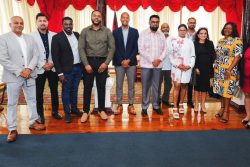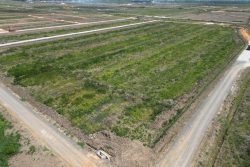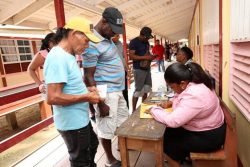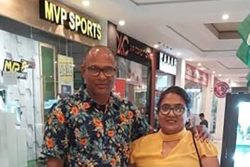CARACAS (Reuters) – Thousands of Venezuelans joined rival marches in Caracas yesterday over a controversial education law that critics say strengthens Presi-dent Hugo Chavez’s grip over schools and universities.
Police fired tear gas when government opponents knocked over a fence marking the end of the authorized route.
A few thousand, many dressed in white, streamed down one of Caracas’s main avenues to protest the law while red-clad government supporters danced to salsa music in the city centre in support of a law they say will boost access to schooling.
A previous attempt to overhaul education was one of the factors that provoked giant protests in 2002, eventually culminating in a failed coup attempt against Chavez.
“We have to fight for this country and for our children,” said one middle-aged woman shrouded in tear gas at the protest who was interviewed on the Globovision television station.
The new law, passed last week, allows community councils that are often pro-government a larger role in the operations of schools and universities. It also calls for the education system to be guided by the “Bolivarian doctrine.”
Simon Bolivar freed several countries from the Spanish empire in the early 19th century. Socialist Chavez des-cribes his own government as a “Bolivarian revolution” and critics say the law will lead to ideological education inspired by communist Cuba.
The government says the law will ensure fairer access to education in the OPEC nation and guarantee free thinking.
Some opposition marchers carried placards that read: “I can’t stand your Cuban law.”
Chavez is committed to strengthening the state in most areas of life in South America’s top oil exporters. He is rushing through over a dozen laws to regulate the economy, the workplace and trade, taking advantage of a weak opposition.
The law was passed last week after small groups of protesters clashed with police who used tear gas and a water cannon to disperse them. A group of journalist protesting the law were severely beaten, apparently by Chavez supporters.
Sensitive to possible violence, the government made sure the routes of two marches did not cross and the interior minister said on Friday alcohol and guns were not permitted.
Venezuela has lax gun laws and it is common for shots to be fired at protests.
The Roman Catholic church and university authorities have opposed the law. The church says it will lead to less religious teaching and remove the state’s obligation to subsidize private, church-run schools in poor neighbourhoods.
University and private school authorities fear it will boost government influence by involving grass-roots community councils, often loyal to Chavez, in their operations.
News companies complain the law includes an article obliging schools to teach children to criticize the media.







